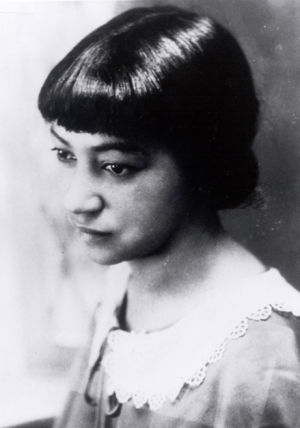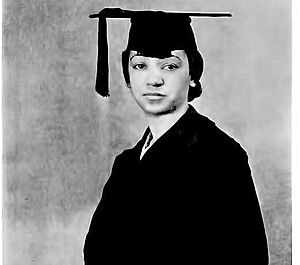Inez Beverly Prosser facts for kids
Quick facts for kids
Inez Beverly Prosser
|
|
|---|---|
 |
|
| Born | December 30, 1895 |
| Died | September 5, 1934 |
| Education | Ph.D in Psychology |
| Alma mater | University of Cincinnati |
| Occupation | Teacher and School Administrator |
| Spouse(s) | Allen Rufus Prosser (1916) |
| Parents |
|
Inez Beverly Prosser (born around 1895 – died September 5, 1934) was a very important psychologist, teacher, and school leader. She is often known as the first African-American woman to earn a Ph.D. in psychology. Her ideas greatly influenced the famous Brown v. Board of Education Supreme Court decision.
Inez grew up in Texas. She studied at Prairie View Normal College, the University of Colorado, and the University of Cincinnati. Sadly, she died in a car accident shortly after getting her doctorate degree.
Contents
Early Life and Education
Inez Beverly Prosser was likely born in San Marcos, Texas, around 1895. Her mother was a homemaker, and her father was a waiter. Inez was the second of eleven children and the oldest daughter.
During her childhood, it was hard for African-Americans to get a good education. Her family moved many times to find the best schools for their children. Inez and her older brother Leon started school in Yoakum, Texas.
Later, they moved to Corpus Christi, but it didn't have a high school for Black students. So, Inez and Leon went back to Yoakum. Inez graduated as the top student from Yoakum Colored School in 1910.
Her parents could only afford to send one child to college. They planned to send Leon. But Inez was very eager to learn, and Leon was not. So, Inez got to go to college instead. She even started a fund to help her younger brothers and sisters go to college too. All eleven children finished high school, and six earned college degrees. Inez earned a teaching degree from Prairie View Normal College, where she was also the top student.
Becoming a Teacher and Leader
After college, Inez taught for a short time in segregated schools in Yoakum. Then, she became an assistant principal at Clayton Industrial School. Later, she took a long-term job at Anderson High School. There, she taught English and coached students for spelling contests. These contests were part of a league for Black high school students in Texas.
In 1916, Inez married Allen Rufus Prosser. He worked as an elevator operator in Austin. While teaching at Anderson, Inez also started working on her bachelor's degree at Samuel Huston College. She finished her Bachelor of Arts degree in 1926, focusing on English and Psychology. She graduated with honors.
Inez loved learning and wanted to continue her education. She went on to earn a Master's degree in Educational Psychology from the University of Colorado. Her master's thesis looked at different types of English grammar tests. This research sparked her interest in psychology even more.
After getting her Master's degree, Prosser left Anderson High School in 1927. She became a faculty member at Tillotson College, which was a college for Black students in Austin. At Tillotson, she showed great teaching and leadership skills. She truly cared about the education and growth of Black students. She even organized a series of lectures, including one by the famous scientist George Washington Carver.
Inez Prosser worked at Tillotson College from 1921 to 1930. She served as the Dean, Registrar, and a Professor of Education. She was second in charge after the college president. Her influence went far beyond the classroom. Later, she moved to Tougaloo College in Mississippi, where she also held teaching and leadership roles. She even became the Principal of Tougaloo High School.
Her career took an important turn when she received a grant from the General Education Board. This money helped her continue her graduate studies. In 1933, she made history by becoming one of the first Black women to earn a PhD in Psychology from the University of Cincinnati.
Important Research on Education
Inez Prosser started her PhD program at the University of Cincinnati in 1931. At that time, there was a lot of research about African Americans in different school settings. Many believed that all-Black schools with Black teachers could best prepare Black students. These schools could help students succeed in a society where opportunities were limited. They also thought segregated schools protected Black students from unfair treatment and helped them build a strong Black identity.
Prosser's PhD paper, called The Non-Academic Development of Negro Children in Mixed and Segregated Schools, became a very important study. It looked at issues like education, social growth, and racial identity related to segregation.
She wanted to find out if Black children developed better character traits and more self-respect when taught by Black teachers in segregated schools. She studied Black students in both "mixed" (integrated) and "segregated" schools. She wanted to see if there were differences in their personalities and mental health.
Prosser used surveys to measure things like vocational interests, social participation, and emotional tendencies. She asked questions like:
- What are the social backgrounds of the children in both groups?
- What are their interests in jobs and activities?
- How much do Black children participate in after-school activities?
- What racial attitudes do they show?
- How do they react emotionally to being discriminated against?
- How does the type of school affect their personality?
- How much are aggressiveness and submission encouraged in the two groups?
In her research, Prosser argued that unfair treatment and feeling alone could harm the mental health of Black children. She believed that mixed schools could cause lasting damage to Black children's mental well-being.
Even though her study was small (only 64 students), Prosser suggested that choosing a school should depend on the student's personality. Some students might do well in integrated schools, but others would benefit more from segregated schools. She felt that most Black students received a more balanced education, care, support, and a stronger connection between home and school in segregated schools. She also noted that segregated schools offered job opportunities and a "more caring environment" for Black teachers and students.
Her work helped show the benefits of mostly Black schools and HBCUs for the Black community. Prosser's tests found that Black children in mixed schools often felt more isolated and inferior. They also had more trouble adjusting socially with teachers, other students, and family. Her work supported the idea that these schools were "safe spaces" for Black students. They helped students build a strong sense of self despite facing unfair treatment.
Prosser's research was significant because it showed that race and racism played a role in how a person's personality developed.
Her Lasting Impact
Segregated schools were a very debated topic during Prosser's time. The "separate but equal" idea from the Plessy v. Ferguson case allowed segregation in many states. Prosser understood that segregated schools could offer Black children a more comfortable place. They wouldn't have to worry about mistreatment from White students.
Prosser was careful to explain the difference between mandatory (forced) and voluntary segregation. She said that forced segregation aimed to isolate a group. But special schools based on voluntary segregation aimed to provide education that fit the needs of the group.
Prosser was a key person in the discussion about how to best educate Black students. Her ideas were used in debates about school segregation in the 1920s and 1930s. She argued that Black children were better off in voluntarily segregated schools.
As a Black female psychologist, Prosser's voice was very important. Her work helped shape the discussions that led to the Brown v. Board of Education U.S. Supreme Court ruling in 1954. This ruling said that segregated schools were unfair and ordered schools to integrate.
Prosser also helped her younger siblings get an education. She paid for five of them to earn college degrees. She gave them money, books, and advice on what courses to take. She was described as supportive and wanting the best for them.
Death
In 1934, Prosser worked hard to improve training for teachers in Mississippi's Black schools. She planned a summer program for teachers at Jackson College and led many workshops.
On August 28, after finishing the summer program, Prosser, her husband, and her sister were driving back to Mississippi from Texas. They were in a car accident near Shreveport, Louisiana. Prosser was seriously injured and died on September 5, 1934, at a hospital in Shreveport. She was buried in San Antonio, Texas.
Honors
- In 1968, she was recognized at the HemisFair '68 exposition in San Antonio, Texas, for her contributions to Texas culture.
- She received a Rockefeller Foundation General Education Board Fellowship.
- She appeared on the cover of The Crisis magazine in August 1933. This was the official magazine of the National Association for the Advancement of Colored People.
Affiliations
Images for kids



